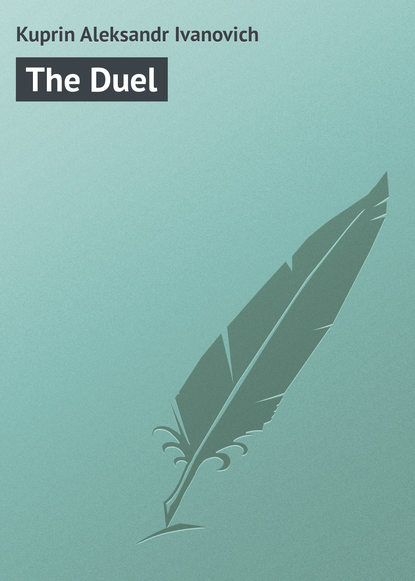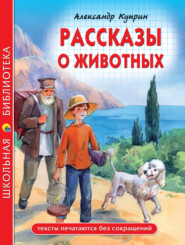По всем вопросам обращайтесь на: info@litportal.ru
(©) 2003-2025.
✖
The Duel
Настройки чтения
Размер шрифта
Высота строк
Поля
“Listen, Pavel Pavlich,” cried Romashov, with tears of rage in his voice. “Do you think views such as Captain Sliva’s are worthy of an officer? And is it not revolting that such old bags of bones should be suffered to insult their subordinates with impunity? Who can put up with it in the long run?”
“Well, yes – to a certain extent you are right,” replied Viätkin, in a tone of indifference. The rest of what he thought of saying died away in a gape, and Romashov continued, in increasing excitement —
“Tell me, what is the use of all this shouting and yelling at the men? I never could imagine when I became an officer that such barbarism was tolerated in our time in a Russian regiment. Ah! never shall I forget my first impressions and experiences here. One incident remains very clearly graven in my memory. It was the third day after my arrival here. I was sitting at mess in company with that red-haired libertine, Artschakovski. I addressed him in conversation as ‘lieutenant,’ because he called me ‘sub-lieutenant.’ Suddenly he began showering insults and abuse on me. Although we sat at the same table and drank ale together, he shouted at me: ‘In the first place, I am not lieutenant to you, but Mr. Lieutenant, and, secondly, be good enough to stand up when you are speaking to your superior.’ And there I stood in the room, like a schoolboy under punishment, until Lieutenant-Colonel Liech came and sat between us. No, no, pray don’t say anything, Pavel Pavlich. I am just sick of all that goes on here.”
XI
THE 22nd of April was for Romashov not only an uncomfortable and tiresome day, but a very remarkable one. At 10 a.m., before Romashov had got out of bed, Nikoläiev’s servant, Stepan, arrived with a letter from Alexandra Petrovna.
MY DEAR ROMOTCHKA (she wrote), I should not be in the least surprised if you have forgotten that to-day is my name-day, of which I also take the liberty to remind you. And in spite of all your transgressions, I should like to see you at my house to-day. But don’t come at the conventional hour of congratulation, but at 5 p.m. We are going to a little picnic at Dubetschnaia. – Yours,
A. N.
The letter trembled in Romashov’s hands as he read it. For a whole week he had not once seen Shurochka’s saucy, smiling, bewitching face; had not felt the delicious enchantment he always experienced in her presence. “To-day,” a joyful voice sang exultant in his heart.
“To-day,” shouted Romashov, in a ringing voice, as he jumped out of bed. “Hainán, my bathwater, quick.”
Hainán rushed in.
“Your Honour, the servant is waiting for an answer.”
“Oh – yes, of course.” Romashov dropped, with eyes wide open, on a chair. “The deuce, he is waiting for a ‘tip,’ and I haven’t a single copeck.” Romashov stared at his trusty servant with a look of absolute helplessness.
Hainán returned his look with a broad grin of delight.
“No more have I either, your Excellency. You have nothing, and I have nothing – what’s to be done? Nichevó!”
At that moment Romashov called to mind that dark spring night when he stood in the dirty road, leaning against the wet, sticky fence, and heard Stepan’s scornful remark: “That man hangs about here every day.” Now he remembered the intolerable feeling of shame he experienced at that moment, and what would he not give if only he could conjure up a single silver coin, a twenty-copeck piece, wherewith to stop the mouth of Shurochka’s messenger.
He pressed his hands convulsively against his temples and almost cried from annoyance.
“Hainán,” he whispered, looking shyly askance at the door, “Hainán, go and tell him he shall have his ‘tip’ to-night – for certain, do you hear? For certain.”
Romashov was just then as hard up as it was possible to be. His credit was gone everywhere – at mess, with the buffet proprietor, at the regimental treasury, etc. He certainly still drew his dinner and supper rations, but without sakuska. He had not even tea and sugar in his room; only a tremendous tin can containing coffee grounds – a dark, awesome mixture which, when diluted with water, was heroically swallowed every morning by Romashov and his trusty servant.
With grimaces of the deepest disgust, Romashov sat and absorbed this bitter, nauseous morning beverage. His brain was working at high pressure as to how he should find some escape from the present desperate situation. First, where and how was he to obtain a name-day present for Shurochka? It would be an impossibility for him to show up at her house without one. And, besides, what should he give her? Sweets or gloves? But he did not know what size she wore – sweets, then? But in the town the sweets were notoriously nasty, therefore something else – scent – a fan? No, scent would, he thought, be preferable. She liked “Ess Bouquet,” so “Ess Bouquet” it should be. Moreover, the expense of the evening’s picnic. A trap there and back, “tip” to Stepan, incidental expenses. “Ah, my good Romashov, you won’t do it for less than ten roubles.”
After this he reviewed his resources. His month’s pay – every copeck of that was spent and receipted. Advance of pay perhaps. Alas, he had tried that way quite thirty times, but always with an unhappy result. The paymaster to the regiment, Staff-Captain Doroshenko, was known far and wide as the most disobliging “swine,” especially to sub-lieutenants. He had taken part in the Turkish War, and was there, alas! wounded in the most mortifying and humiliating spot – in his heel. This had not happened during retreat, but on an occasion when he was turning to his troops to order an attack. None the less he was, on account of his ill-omened wound, the object of everlasting flings and sarcasms, with the result that Doroshenko, who went to the campaign a merry ensign, was now changed into a jealous, irritable hypochondriac. No, Doroshenko would not advance a single copeck, least of all to a sub-lieutenant who, with uncommon eagerness, had long since drawn all the pay that was due to him.
“But one need not hang oneself, I suppose, for that,” Romashov consoled himself by thinking, after he had finished the foregoing meditation. “One must try and borrow. Let us now take the victims in turn. Well, the 1st Company, Osadchi?”
Before Romashov’s mind’s eye appeared Osadchi’s peculiar but well-formed features and his heavy, brutal expression. “No, anybody else in the world except him. Second Company, Taliman? Ah, that poor devil, who is borrowing all the year round, even from the ensigns. He won’t do. Take another name – Khutinski?”
But just at that moment a mad boyish idea crossed Romashov’s mind. “Suppose I go and borrow money from the Colonel himself. What then would be likely to happen? First he would be numbed with horror at such a piece of impudence; next he would begin trembling with rage, then he would fire, as if from a mortar, the words: ‘Wha-at! Si-lence!’”
Romashov burst out laughing. “How in the world can a day that began so happily as this ever end sadly and sorrowfully? Yes, I don’t know yet how the problem is to be solved, but an inward voice has told me that all will go well. Captain Duvernois? No, Duvernois is a skinflint, and, besides, he can’t bear me. I know that.”
In this way he went through all the officers of his company, from the first to the sixteenth, without getting a step nearer his goal. He was just about to despair altogether when suddenly a new name sprang up in his head – Lieutenant-Colonel Rafalski.
“Rafalski! What an ass I am! Hainán, my coat, gloves, cap. Make haste!”
Lieutenant-Colonel Rafalski, commander of the 4th Battalion, was an incorrigible old bachelor, and, in addition, a most eccentric character, who was called by his comrades “Colonel Brehm.” He associated with no one, was seen among the circle of his brother officers only on occasions of ceremony, i.e. at Easter and on New Year’s Day, and he neglected his duties to such a degree that at drill he was the constant object of furious invectives on the part of the higher authorities. All his time, all his attention, and all his unconsumed funds of love and tenderness, which he really possessed, were devoted to his idolized protégés, his wild creatures – brutes, birds, and fishes, of which he owned almost an entire menagerie. The ladies of the regiment, who in the depths of their hearts were highly incensed with Rafalski for his unconcealed contempt of women, used to say of him: “Such a dreadful man, and what dreadful animals he keeps! Such dirtiness in his house, and, pardon the expression, what a nasty smell he carries with him wherever he goes.”
All his savings went to the menagerie. This most eccentric individual had succeeded in reducing his temporal needs to a minimum. He wore a cap and uniform that dated from prehistoric times, he slept and dwelt God knows how, he shared the soldiers’ fare, and he ate in the 15th Company’s kitchen, towards the staff of which he displayed a certain liberality. To his comrades – particularly the younger of them – he seldom refused a small loan if he was in funds, but to remain in debt to “Colonel Brehm” was not regarded as comme il faut, and he who did so was inevitably exposed to his comrades’ ridicule and contempt.
Frivolous and impudent individuals as, e.g. Lbov, were occasionally not averse from extracting a few silver roubles from Rafalski, and they always introduced the business by a request to be allowed to see the menagerie. This was generally an infallible way to the old hermit’s heart and cash-box. “Good morning, Ivan Antonovich, have you got any fresh animals? Oh, how interesting! Come and show us them,” etc., in the same style. After this the loan was a simple matter.
Romashov had many times visited Rafalski, but never up to then with an ulterior motive. He too was particularly fond of animals, and when he was a cadet at Moscow, nay, even when he was a lad, he much preferred a circus to a theatre, and the zoological gardens or some menagerie to either. In his dreams as a child there always hovered a St. Bernard. Now his secret dream was to be appointed Adjutant to a battalion – so that he might become the possessor of a horse. But neither of his dreams was fulfilled.
The poverty of his parents proved an insuperable obstacle to the realization of the former, and, as far as his adjutancy was concerned, his prospects were exceedingly small, as Romashov lacked the most important qualifications for it, viz. a fine figure and carriage.
Romashov went into the street. A warm spring breeze caressed his cheeks, and the ground that had just dried after the rain gave to his steps, through its elasticity, a pleasant feeling of buoyancy and power. Hagberry and lilac pointed and nodded at him with their rich-scented bunches of blossom over the street fences. A suddenly awakened joy of life expanded his chest, and he felt as if he was about to fly. After he had looked round the street and convinced himself that he was alone, he took Shurochka’s letter out of his pocket, read it through once more, and then pressed her signature passionately to his lips.
“Oh, lovely sky! Beautiful trees!” he whispered with moist eyes.
“Colonel Brehm” lived at the far end of a great enclosure hedged round by a green lattice-like hedge. Over the gate might be read: “Ring the bell. Beware of the dogs!”
Romashov pulled the bell. The servant’s sallow, sleepy face appeared at the wicket.
“Is the Colonel at home?”
“Yes. Please step in, your Honour.”
“No. Go and take in my name first.”
“It is not necessary. Walk in.” The servant sleepily scratched his thigh. “The Colonel does not like standing on ceremony, you know.”
Romashov strode on, and followed a sort of path of bricks which led across the yard to the house. A couple of enormous, mouse-coloured young bull-dogs ran out of a corner, and one of them greeted him with a rough but not unfriendly bark. Romashov snapped his fingers at it, which was answered in delight by awkward, frolicsome leaps and still noisier barking. The other bull-dog followed closely on Romashov’s heels, and sniffed with curiosity between the folds of his cape. Far away in the court, where the tender, light green grass had already sprouted up, stood a little donkey philosophizing, blinking in delight at the sun, and lazily twitching its long ears. Here and there waddled ducks of variegated hues, fowls and Chinese geese with large excrescences over their bills. A bevy of peacocks made their ear-splitting cluck heard, and a huge turkey-cock with trailing wings and tail-feathers high in the air was courting the favourite sultana of his harem. A massive pink sow of genuine Yorkshire breed wallowed majestically in a hole.
“Colonel Brehm,” dressed in a Swedish leather jacket, stood at a window with his back to the door, and he did not notice Romashov as the latter entered the room. He was very busy with his glass aquarium, into which he plunged one arm up to the elbow, and he was so absorbed by this occupation that Romashov was obliged to cough loudly twice before Rafalski turned round and presented his long, thin, unshaven face and a pair of old-fashioned spectacles with tortoise-shell rims.
“Ah, ha – what do I see? – Sub-lieutenant Romashov? Very welcome, very welcome!” rang his friendly greeting. “Excuse my not being able to shake hands, but, as you see, I am quite wet. I am now testing a new siphon. I have simplified the apparatus, which will act splendidly. Will you have some tea?”
“I am very much obliged to you, but I have just breakfasted. I have come, Colonel, to – ”
“Of course you have heard the rumour that our regiment is to be moved to garrison another town,” interrupted Rafalski, in a tone as if he had only resumed a conversation just dropped. “You may well imagine my despair. How shall I manage to transport all my fishes? At least half of them will die on the journey. And this aquarium too; look at it yourself. Wholly of glass and a yard and a half long. Ah, my dear fellow” (here he suddenly sprang into a wholly different train of thought), “what an aquarium they have in Sebastopol! A cistern of continually flowing seawater, big as this room, and entirely of stone. And lighted by electricity too. You stand and gaze down on all those wonderful fishes – sturgeons, sharks, rays, sea-cocks – nay, God forgive me my sins! sea-cats, I mean. Imagine in your mind a gigantic pancake, an arshin[17 - Arshin = 2·33 feet.] and a half in diameter, which moves and wags – and behind it a tail shaped like an arrow. My goodness, I stood there staring for a couple of hours – but what are you laughing at?”
“I beg your pardon, but I just noticed a little white rat sitting on your shoulder.”
“Oh, you little rascal! Who gave you leave?” Rafalski twisted his head and produced with his lips a whistling but extraordinarily delicate sound that was remarkably like the cheeping noise of a rat. The little white, red-eyed beast, trembling all over its body, snuggled up to Rafalski’s cheek, and began groping with its nose after its master’s mouth and chin-tuft.
“How tame your animals are, and how well they know you!” exclaimed Romashov.
“Yes, they always know me well enough,” replied Rafalski. After this he drew a deep sigh and sorrowfully shook his grey head. “It is unfortunate that mankind troubles itself and knows so little about animals. We have trained and tamed for our use or good pleasure the dog, the horse, and the cat, but how much do we know about the real nature and being of these animals? Now and then, of course, some professor – a marvel of learning – comes along – may the devil devour them all! – and talks a lot of antediluvian rubbish that no sensible person either understands or has the least profit from. Moreover, he gives the poor innocent beasts a number of Latin nicknames as idiotic as they are unnecessary, and to crown it all, he has the impudence to demand to be immortalized for all this tomfoolery, and pretty nearly venerated as a saint. But what can he teach us, and what does he know himself, of animals and their inner life? No! take any dog you like, live together with it for a time, side by side, and, by the study of this intelligent, reflecting creature, you will get more matter for your psychology than all the professors and teachers could dream.”
“But perhaps there are works of that nature, though we do not yet know them?” suggested Romashov shyly.
“Books, did you say? Yes, of course, there are plenty. Just glance over there. I have a whole library of them.”

















